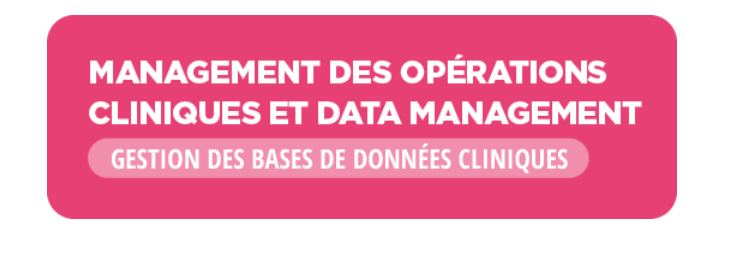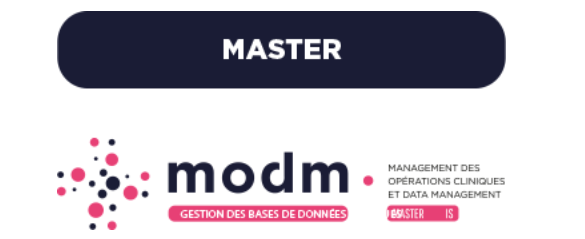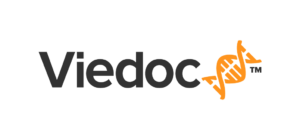MODM Clinical Database Management



THE COURSE PROVIDES DUAL SKILLS IN CLINICAL RESEARCH AND PROJECT MANAGEMENT. IT TRAINS MANAGERS SPECIALIZED IN CLINICAL RESEARCH: CLINICAL DATA MANAGERS
OBJECTIVES
The aim is to train managers specializing in Clinical Data Management, and to promote their rapid employability through academic and work-study training. Specialization in Master 2.
SPECIFIC KNOWLEDGE PROVIDED BY THE COURSE
- Clinical trial monitoring and logistics
- Essential ICH documents for the conduct of trials (before, during and at the end of the trial). RGPD in Clinical Research
- SAS, SQL and R programming
- Designing the database from the CRF
- Quality control, data validation, coding and dictionaries, laboratory data, base gel
- CDISC and SDTM standards, Risk Based Monitoring
- Outsourcing in Data Management
- Use of professional software
SPECIFIC SKILLS PROVIDED BY THE COURSE
- ARC competence in M1
- Set up a clinical database in compliance with CDISC recommendations and regulations
- Ability to define the necessary consistency checks to guarantee a reliable database that complies with the test protocol
- Program these consistency checks using professional SAS software.
- Identifying and managing risks
- Plan and carry out all the quality control steps required to obtain a clean database
TEACHING RESOURCES AND PROFESSIONAL EXPERIENCE
- Since the start of the 2021 academic year, practical teaching and the APP have been carried out on the Viedoc eCRF, thanks to close collaboration between the course and the Viedoc team.

- Educational space for 3D printing in healthcare. Learning Lab, flipped courses, interactive seminars, company visits, project-based learning...
- Numerous professional guest speakers
- M1 + M2 open to apprenticeships, schedules adapted to optimize practical training
CAREER OPPORTUNITIES
DATA MANAGER IN: CRO - Pharmaceutical laboratories - Academic structures
IN THE SECTORS: Pharmaceutical, veterinary, nutrition or medical devices
Students in the Master 2 MODM Clinical Database Management program explain their educational choices and their vision for the future.
Video : interview with a graduate who went through the world of work at EXCELYA for SANOFI , as part of INSIDE IS ISMA

all core courses (m1+m2) (download)
all M1 units in the data management course:
Semester 1
Common core S1
TU PAM1ARFQ - Regulatory and financial aspects, Quality and safety
Number ECTS = 5 - Responsible for TU : Béatrice BAÑULS
Prerequisites:
Introduction to Law desirable but not required
The essential principles of Quality Management
Marketing
Understanding the role of marketing and the analytical aspect (various market studies)
Financial analysis
Know at least the company's accounts and the role of related items (balance sheet and income statement).
Content and objectives of theTU :
Pharmaceutical law(18h CM in common with Master Sciences du médicament)
Environnement Juridique du Médicament (1h)
Les Produits de Sante : Notions et Régimes (1h)
Etablissements Pharmaceutiques (2h)
AMM UNION EUROPEENNE (médicaments particuliers) (3H)
AMM HORS TU et CTD (3H)
Pharmacovigilance (2H)
Prix remboursement (2H)
Publicité (2H)
Propriété industrielle (2H)
Know the different texts applicable to the field of drugs, their origin, their legal value, their articulation.
Know the notions of the different health products
Know the basic framework for protecting innovation, manufacturing, marketing and monitoring drugs.
Marketing: 9h CM
The global marketing approach
Reminder of market research
Diagnostic tools and strategic orientations
Integrate the global marketing approach
Know the diagnostic tools and strategic orientations
Financial analysis: 6h CM + 3h TD
Introduction to financial analysis
Principle of comparative analysis
Different ratios: financial, economic, cash flow
Know how to analyze the profitability, solvency and liquidity of an economic activity (industrial company).
Quality Management: 12 hCM + 3 h TD (in common with Master Sciences du médicament except course 3)
Within the framework of quality management in companies, based on Good Practices and ISO standards:
1. Reminder of the basics of Quality Systems and corporate organization and documentation (3h)
2. Quality Control and Quality Assurance (2h)
3. Qualification and Validation: Control of equipment/software and production processes (2 X 1.5h as for Master IS)
4. Management of deviations and non-conformities (2h)
5. Continuous improvement: Corrective and preventive actions (2h)
3h TD: Non-conformity - CAPA
Safety: 6 hrs CM
Introduction to ICPE
Corporate social responsibility: protecting workers and the environment
Safety data sheets and classification of hazardous substances and products: key elements of CSR
Teaching methods:
Marketing and Financial Analysis
Lectures with student interaction through the content and examples provided.
Specific questioning on each part covered.
TU PAM1BADO - Databases - Epidemiology and Health-Environment
Number ECTS = 5 - Responsible for TU : Hélène FENET -Aurélie ESCANDE - Patrice RAVEL
Epidemiology:Health indicators, descriptive, etiological and evaluative epidemiology
Health-Environment:Structuring of public health, national and regional management of environmental health through public health plans, corporate social responsibility, description and behavior of different types of pollutants at environmental and health risk, examples of problematic contaminants for health.
Databases:Relational model, simple SQL queries, table creation, constraint management, data import, form creation, report creation, macro creation and use of VBA in ACCESS™.
The student must acquire the skills to be able to
→Apprehendepidemiological studies:
Identify epidemiology as a public health tool
Know the tools of epidemiological surveillance
Know the different types of epidemiological surveys
Know how to interpret descriptive epidemiology indicators
Know how to calculate and interpret the results of risk calculations (RR and OR) from analytical epidemiology
Know how to describe and criticize strategies, study protocols used in epidemiology
Be able to assess the validity of screening tests
→Knowthe behavior and impacts of pollutants on health and the management tools in legislation (through examples)
Discover public health management in France,
Recognize the stakes involved in environmental health
→Discoverthe basics of database management
Understand how Information is structured using the relational model
Recognize the different ways of using databases (Administrator/client)
Build a database with a few tables
Be able to define the main constraints on a database
Be able to use the main SQL language commands.
Be autonomous on the ACCESS data management system (Microsoft)
TU PAM1SDPS - Healthcare Product Development Strategy, Project Management and Clinical Development
Number ECTS = 5 - Responsible TU : Xavier GARRIC
Prerequisites: General knowledge of biology, chemistry and galenic pharmacy
TU Content and Objectives: 44H C
Healthcare product development strategy and industrial environment: 29h CM :
- General knowledge of the pharmaceutical, cosmetology and medical device sectors
- Knowledge of the regulatory and socio-economic specificities of the pharmaceutical, cosmetology and medical device sectors
- Ethics in healthcare
- Functioning and culture of healthcare companies
Project management: 3h CM
- Introduction to health product development project management
Clinical development: 12h CM
- Introduction to the conduct of clinical trials in compliance with Good Clinical Practice (GCP)
- Drug development
- Clinical trial methodology
- The standard design of a clinical trial protocol
Teaching methods:
Lectures focusing on popularization, with the emphasis on exchanges with students
Tutorials using computerized project management tools
TU PAM1BIAP - Biotechnologies applied to health
Number of ECTS = 5 - TU supervisors : Armelle CHOQUET & Arnault GRAINDORGE
Prerequisites: Knowledge of molecular and cellular biology (L3 level)
TU content and objectives: 22h CM + 6h TD + 22h TP
CM
- Identification of molecular or cellular targets (Introduction=2h, -omics approaches=2h) and notions of biomarkers=2h (6h)
- Recombinant DNA technology=2h, CRISPR-Cas=2h, synthetic biology (2h): (6h)
- Industrial applications/examples: proteins, antibodies and vaccines (5h); optimization of biomedicines (2h), contemporary biotechnologies (3h). (10h)
TD
- Recombinant DNA, virtual cloning (6h)
Practical work
- TP1 => Cloning, production, purification and characterization of a recombinant protein (12h)
- TP2 => Setting up a cell model for medium-throughput screening (10h)
Objectives:
Learn about the various health products derived from biotechnologies
Acquire notions of therapeutic targets and biomarkers
Acquire notions of medium- and high-throughput screening
Learn about recombinant DNA, molecular biology and synthetic biology technologies
Gain a concrete insight into the conditions for producing a recombinant protein and developing a cellular model compatible with medium-throughput screening (practical work).
Teaching methods:
The format of this TU, with its strong emphasis on practical workshops and examples, should enable students to gain a fairly precise view of the use of biotechnologies in healthcare or industry in general.
TU PAM1LVCO - Modern Languages and Communication
Number ECTS = 5 - Responsible TU : Gregory NICKSON and Béatrice BANULS
Prerequisite: BAC level
Contents and objectives of theTU :
Modern languages: 40h TD
Develop communication skills in a foreign language.
Specialized vocabulary.
Knowledge of business and health issues in the target language countries.
Cultural approach.
Communication: 9h TD
Know how to work in a team and position yourself within a group.
Notion of group dynamics and team cohesion.
Communicate effectively, listen actively and share ideas (techniques, modes and networks).
Establish constructive professional relationships (attitudes and postures); collaboration and consultation.
Negotiation techniques
TD Bibliography: 3h TD
Use the bibliographic resources of a university library
Produce a relevant bibliography on scientific subjects
Teaching methods:
Job interview simulation, oral presentation with PowerPoint, meeting simulation, letter and e-mail writing, debates, reading documents etc....
Practical work on the different skills (written and oral comprehension/expression)
TOEIC practice
Methodological aspects (according to group needs)
Exercises on digital platform to review and consolidate knowledge of the language.
Communication: test, exercises, role-playing
SPECIFIC TU : CLINICAL OPERATIONS MANAGEMENT and DATA MANAGEMENT (S1)
TU PAM1AXET: THERAPEUTIC APPROACHES - PHARMACOKINETICS - PEC
Number of ECTS = 5 - Responsible for TU : Patrice Ravel
Prerequisites: Physiology program (Bachelor's degree), knowledge of clinical trial procedures
Modalities: 43.5h CM + 6h TD
Objectives
- Provide students intending to work in clinical research with a basic knowledge of the various therapeutic areas covered by clinical studies.
- Understanding the pharmacokinetic file
- Oral and written presentation skills
TU CONTENTS
THERAPEUTIC APPROACHES
Oncology, Cardiovascular, CNS, Pneumology, Thrombosis, Diabetes, Hypertension, Hematology, Rheumatology, Psychiatry, Analgesics, Malaria, Infectiology, Vaccine trials, Medical device trials
PHARMACOKINETICS
Definition of the main variables involved in Phase 1 clinical development
PEC
Oral presentations by English and French students
CV and cover letter proofreading
Teaching methods :
Lectures and tutorials
PAM1S2ST - 3 to 5 month work placement
Number ECTS = 10 - Responsible TU :Béatrice BAÑULS
Prerequisites:
Completion of at least one internship in the Bachelor's program
TU Master 1 core curriculum and specific to each pathway
Content and objectives of theTU :
2h CM: preparation and instructions for finding and carrying out an internship
3 to 5 months full-time in a public or private company.
Apply the knowledge acquired during the training
Carry out a concrete professional project in the context of its activities
Teaching methods :
Written report , Oral test, Assessment by training supervisor
Semester 2
COMMON CORE (S2)
PAM1S2LV - English and 2nd language
Number of ECTS = 5 -
In charge of TU : Caroline WEMYSS and Peter WEINMANN
Prerequisite: BAC level
Content and objectives of theTU :
Work on all communication skills: written and oral expression and comprehension
Knowledge of the international professional and cultural environment
Job interview simulation, oral presentation with PowerPoint, meeting simulation, letter and e-mail writing, debates, document reading, etc.
Methodological aspects (according to group needs)
Exercises on digital platform to review and consolidate knowledge of the language.
Develop communication skills in a foreign language.
Specialized vocabulary
Knowledge of business and health issues in the target language countries
Cultural approach
Teaching methods :
Work on all communication skills: written and oral expression and comprehension
Knowledge of the international professional and cultural environment
Job interview simulation, oral presentation with PowerPoint, meeting simulation, letter and e-mail writing, debates, document reading, etc.
Methodological aspects (according to group needs)
Exercises on digital platform to review and consolidate knowledge of the language
PAM1S2ST - 3 to 5 month work placement
Number ECTS = 10 - Responsible TU :Béatrice BAÑULS
Prerequisites:
Completion of at least one internship in the Bachelor's program
TU Master 1 core curriculum and specific to each pathway
Content and objectives of theTU :
2h CM: preparation and instructions for finding and carrying out an internship
3 to 5 months full-time in a public or private company.
Apply the knowledge acquired during the training
Carry out a concrete professional project in the context of its activities
Teaching methods :
Written report , Oral test, Assessment by training supervisor
SPECIFIC TU : CLINICAL OPERATIONS MANAGEMENT and DATA MANAGEMENT (S2)
TU PAM1MON: CLINICAL TRIAL MONITORING AND LOGISTICS
Number of ECTS = 5 - Responsible for TU : Patrice RAVEL
Essential prerequisites: This TU cannot be dissociated from the other TU specific to the course.
Modalities : 41 h CM + 6 h TD This TU includes reference hours (APP + hospital internship)
Objectives
- Provide students intending to become Clinical Research Associates with the basic knowledge needed to set up and monitor clinical trials in line with good clinical practice.
- Define the different phases of clinical trials.
- Present the job of Clinical Research Associate (CRA) and all its missions.
Contents
Phase I, II, III clinical trials
Clinical trial monitoring and logistics
- Trial set-up, protocol, observation notebook, e-CRF,
- Follow-up of monitoring visits from the 1st visit to the closing visit.
- Investigators: recruitment, training, brochures
- Essential documents for conducting tests (before, during and at the end of the test)
- Documents for submission to HAS (ANSM, CPP, CNIL, etc.)
- Clinical batch distribution
The players and professions involved in clinical research
- The Arc laboratory/ Arc hospital profession
- Structures involved in clinical research (CIC, URC, CRC, CRB, etc.),
Bioequivalence tests
- Medical device testing
Hospital internship (4 weeks)
Speakers: External professionals
TU PAM1AFRE: REGULATORY AFFAIRS, BPC, PHARMACOVIGILANCE
Number of ECTS = 5 - Responsible for TU : Patrice RAVEL
Essential prerequisites: This TU cannot be dissociated from the other TU specific to the course.
Modalities :32 h CM + 6h CM +3h TD
Objectives
- To provide students intending to work in Clinical Research and Development with basic knowledge of the regulatory environment.
- Mastering Good Clinical Practice - standardization ICH, CTD, FDA, EMEA, ANSM, CPP ...
- Acquire the basics of pharmacovigilance and adverse reactions.
- Give the basics of clinical trial planning.
Contents
- Regulatory environment for clinical trials
- Good clinical practice - standardization ICH, CTD, FDA, EMEA, ANSM, CPP, ...
- Quality assurance and quality control in clinical research and auditing
- Pharmacovigilance, serious and non-serious adverse reactions
- Operational planning
Teaching methods :
- Lectures, tutorials and projects supervised by professionals.
Assessment methods :Written test - Case study
Speakers: University of Montpellier and external professionals
TU PAM1DATA: INTRODUCTION TO CLINICAL DATABASE MANAGEMENT - DATA MANAGEMENT
Number of ECTS=5 - Responsible TU : Patrice RAVEL
Prerequisite:
This TU cannot be dissociated from the other TU specific to the course.
Statistics prerequisite: L3 Health Engineering level.
Objectives
- Introduction to clinical database management (Data Management)
- Know how to create a database from a CRF, and understand the main data quality controls.
- Learn about Data Management and the main tasks of a Data Manager.
- Know the different tools for entering source data.
- Master the basics of statistical analysis applied to clinical trials.
Contents
Data Management
- Definition and missions of a Data Manager
- Database structure, data quality control, freeze base
Introduction to SAS language
- Create tables, import data files, use simple procedures for statistical analysis of clinical data.
Statistical methodology applied to clinical research
- Statistics reminder
- Experimental designs: parallel designs, matched series designs, cross-over designs, bioequivalence tests
Epidemiological studies
Medical writing
Teaching methods :
- CM, TD, TP, and implementation of lessons through a tutored project on ACCESS
- 5 sessions of 3 hours of practical work on SAS software per student
Assessment methods :
- Written test - SAS practical test and continuous assessment
- Tutored project and written report
Speakers
University of Montpellier: P. RAVEL, M. VIVIEN, R. SABATIER and external professionals
